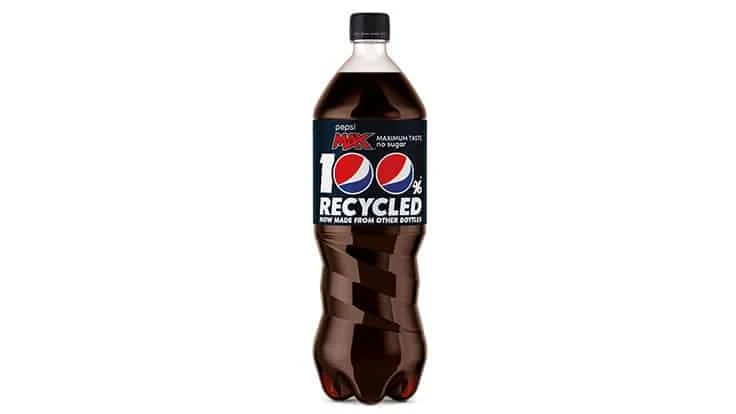
Image courtesy of PepsiCo
The Berkeley, California-based nonprofit group that promotes shareholder advocacy, As You Sow, has announced that PepsiCo Inc., headquartered in Purchase, New York, has agreed to reduce its total virgin nonrenewable plastic use across its brands by 20 percent by 2030.
The company reached an agreement with As You Sow in March to set an absolute plastic reduction target following the filing of a shareholder resolution on the topic but needed time to assess the size of the cuts, according to the nonprofit.
The commitment should reduce the company’s use of virgin nonrenewable plastic by about 460,000 tons over the next nine years and result in a 50 percent cut in virgin nonrenewable plastic when measured per serving across its food and beverage portfolios. As You Sow says PepsiCo projects that by expanding its SodaStream business, which allows consumers to make beverages at home without containers, it could avoid the use of 200 billion plastic bottles by 2030.
“We are pleased that the company set a significant goal to reduce plastic use by one-fifth,” says Conrad MacKerron, senior vice president of As You Sow. “However, we have some concern that the timeline for reduction is five years longer than several of its peers have committed to.”
Four other large companies—Keurig Dr Pepper, Mondelez International, Target Corp. and Walmart Inc.— agreed to virgin plastic reductions earlier this year that will be achieved by 2025, the nonprofit says. “Given Pepsi’s huge plastic footprint and rapidly increasing pollution of land and oceans by plastic packaging, reductions need to be achieved as quickly as possible,” MacKerron adds.
“Pepsi’s announcements on plastic and packaging move the company in the right direction, but there is much more it will need to do to take effective action on plastic packaging pollution," Kelly McBee, waste program coordinator at As You Sow, says.
In 2020, PepsiCo ranked as a laggard company with a D+ grade in As You Sow's Waste & Opportunity report, which scored 50 companies on plastic pollution. The company’s new commitments do not address some of its lowest scoring areas relating to increasing reusable and refillable packaging and financial support for recycling infrastructure to secure recycled material, according to the nonprofit.
PepsiCo announced its plastic reduction targets as part of its wider "strategic end-to-end transformation to drive sustainable long-term value and competitive advantage," Pep+.
Pep+ has three pillars:
- Positive Agriculture, which involves spreading regenerative practices to restore the Earth across the company’s entire agricultural footprint, approximately 7 million acres;
- Positive Value Chain, which involves achieving net-zero emissions by 2040, becoming net water positive and establishing new goals to improve packaging sustainability; and
- Positive Choices, which involves leveraging the scale and reach of its global brands to drive positive impact at scale, evolving its portfolio into spaces that are better for the planet and people, including plant-based proteins, nuts and seeds and whole grains; and expanding its SodaStream business.
"Pep+ directly links the future of our business with the future of our planet, for the benefit of both–from how we source ingredients and make and sell our products; to how we inspire consumers through our iconic brands to make better choices for themselves and the planet; to how we support communities and improve livelihoods throughout our supply chain," says Jim Andrew, chief sustainability officer, PepsiCo. "Take SodaStream, for example. By rapidly expanding the SodaStream ecosystem, we are meeting the needs of consumers at home, away from home, and on-the-go. At the same time, we are also offering consumers positive choices that use less plastic, create fewer emissions and are better for people. Pep+ is our road map to create the food and drinks people love in a way that helps build the sustainable future we all must have."
PepsiCo says its food and beverage portfolio brands are accelerating their efforts to realize the company's sustainable packaging vision and leveraging their influence to educate consumers on recycling and the planetary impacts of their choices. In 11 European markets, key Pepsi products are moving to 100-percent recycled polyethylene terephthalate (rPET) bottles by 2022, which the company says is estimated to reduce greenhouse gas emissions by roughly 30 percent per bottle. In the U.S., all Pepsi-branded products will be converted to 100 percent rPET bottles by 2030, with Pepsi Zero Sugar beginning to be sold in 100 percent rPET bottles by 2022. PepsiCo also has been investing in food packaging technology and is introducing a fully compostable bag made with plant-based materials. Starting with Off The Eaten Path, one of Frito-Lay's plant-based brands, this industrially compostable packaging will be available to consumers in the U.S. at Whole Foods stores beginning in September. The company also announced that it is willing to work with other companies to license the same technology at no cost given the importance of creating a circular food packaging system.
Latest from Recycling Today
- Aqua Metals secures $1.5M loan, reports operational strides
- AF&PA urges veto of NY bill
- Aluminum Association includes recycling among 2025 policy priorities
- AISI applauds waterways spending bill
- Lux Research questions hydrogen’s transportation role
- Sonoco selling thermoformed, flexible packaging business to Toppan for $1.8B
- ReMA offers Superfund informational reports
- Hyster-Yale commits to US production





